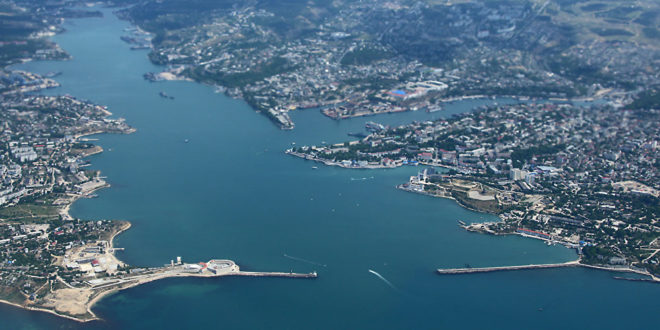By Dr. Shehab Al Makahleh
The Russia – Islamic World strategic vision group led by Tatarstan President Rustam Minnikhanov has hosted a two-day forum of Journalists from Muslim Countries against Extremism in the southern Russian city of Yalta. The conference was attended by more than 50 journalists from Russia, Bahrain, Egypt, Iraq, Iran, Kazakhstan, Kuwait, Bangladesh, Morocco, Algeria, Qatar, Saudi Arabia, Sudan, Syria, Lebanon, Turkey, Uzbekistan, Albania, Indonesia, Jordan and the UAE.
The forum of Yalta took place April 24 at the luxury Mriya Hotel, southwest of the city and discussed strategies of partnerships between Russia and the Muslim world.
The objective of the conference was to widen and deepen cooperation between Russia and the countries of the Muslim world as well as the Muslim communities in the various spheres. Significant attention will be paid to the role of the religious organizations – religious boards of Muslims and other Islamic centers united into Russia Mufties Council in development and strengthening of ties with co-believers from other countries.
Sergei Aksyonov, president of Crimea, said that in the past there were some obstacles; however, at present, there are many incentives and new horizons of developments between Crimea and other countries including Arab and Muslim states.
Aksyonov told Geostrategic Media: “We have debated the means and strategies to promote the peninsula economically, and to turn it into a tourist hub”.
He voiced his pledge in unequivocal terms a de-bureaucratization of economic life, saying that any investor will be received by a senior official in Crimea at the level of minister to facilitate his mission in the peninsula as an investor, adding that unexploited potentials of Crimea are gigantic, predominantly in tourism and health tourism due to the many spas in the region.
It has been surprising that there have been no tanks in the streets or any military troops.
What has been aired in the media that Crimea is not stable is fake and untrue.
A new airport and a bridge under construction
On the way from the new airport to the resort, one can find out that so many investments the Russian government is pumping into this region. Aksyonov said that 12 investment agreements for Crimea have been concluded, worth 1 billion euros, mainly by Russian firms or Russian state entities.
About 427 million euros are directed to the construction process of the new airport of Simferopol, the capital of Crimea. The construction is scheduled to be concluded end of 2018. This new airport will create more tourism domestically and internationally to Crimea, with hopes of bringing 12 million tourists to the peninsula in the coming 4 years.
Another major investment is 19 kilometers long bridge across the Kerch Strait connecting Crimea to Russia. This first direct road and rail connection to the Russian mainland is expected to be completed end of December 2018.
Partnership between Muslims and Russians
The patriotic feelings towards their country helped the Russians to move ahead and reach their goals in spite of all economic, security and political hardships. When we look at the current history of Muslim-Russian relations, we see that the bilateral relations developed with a constant acceleration rate from 2000 until present. The Muslim-Russian reciprocal constitutive relation has influenced considerably the actions, interests, and identities of the two partners. The Arab Spring enforced Russian Muslim cooperation to counter terrorism and to sort out mutual interests. However, the international relations identity of Russia is relatively different from the Soviet era. This has resulted in a new identity of Russia that has changed its imprinted stereotyped image in Muslim mentalities as a communist country.
Ruslan Beck, the current MP of the State Duma, said: “Peace and tranquillity is the main thing not for us here on the Crimean peninsula, but for all the world. As you have seen, we are in the process of rebuilding the territory after years of marginalization. There is no war on our soil, we live in harmony, and everyone helps and respects each other; for us to live in peace within our homeland, it is a priority. ”
 Geostrategic Media Political Commentary, Analysis, Security, Defense
Geostrategic Media Political Commentary, Analysis, Security, Defense





